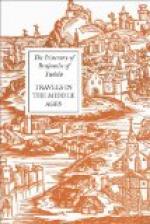Benjamin gives us a vivid sketch of the Egypt of his day. Peace and plenty seemed to prevail in the country. This happy state of things was entirely due to the wise measures taken by Saladin, who, however, kept himself so studiously in the background, that not even his name is mentioned in the Itinerary. The deposition of the Fatimite Caliph on Friday, September 10, 1171, and his subsequent death, caused little stir. Saladin continued to govern Egypt as Nureddin’s lieutenant. In due course he made himself master of Barca and Tripoli; then he conquered Arabia Felix and the Soudan, and after Nureddin’s death he had no difficulty in annexing his old master’s dominions. The Christian nations viewed his rapidly growing power with natural alarm.
About that time news had reached Europe that a powerful Christian king named Prester John, who reigned over a people coming from Central Asia, had invaded Western Asia and inflicted a crushing defeat upon a Moslem army. Pope Alexander iii conceived the hope that a useful ally could be found in this priest-king, who would support and uphold the Christian dominion in Asia. He accordingly dispatched his physician Philip on a mission to this mysterious potentate to secure his help against the Mohammedans. The envoy never returned.
Benjamin is one of the very few writers of the Middle Ages who gives us an account of these subjects of Prester John. They were no other than the infidels, the sons of Ghuz, or Kofar-al-Turak, the wild flat-nosed Mongol hordes from the Tartary Steppes, who, in Benjamin’s quaint language, “worship the wind and live in the wilderness, who eat no bread and drink no wine, but feed on uncooked meat. They have no noses—in lieu thereof they have two small holes through which they breathe.”
These were not men likely to help the Christians. On the contrary, as is so fully described in Benjamin’s Itinerary, they broke the power of Sultan Sinjar, the mighty Shah of Persia, who, had he been spared by the men of Ghuz, would have proved a serious menace to Saladin.
It took Saladin some years to consolidate his empire.
In 1187 he felt himself in a position to engage the Franks in a decisive conflict. At the battle of Tiberias, Guy, the Latin king, was defeated and taken prisoner. The Knights-Templars and Hospitalers, of whose doings at Jerusalem Benjamin gives us particulars, either shared the fate of the king or were slain in action. Jerusalem fell soon afterwards. Pope Alexander iii roused the conscience of Europe, and induced the pick of chivalry to embark upon the Third Crusade in 1189. But the prowess of the Emperor Frederic Barbarossa, the gallantry of Richard I of England, the astuteness of Philip Augustus of France, were of no avail. The Fourth and Fifth Crusades were equally unsuccessful, and the tide of Islam’s success rose high.




